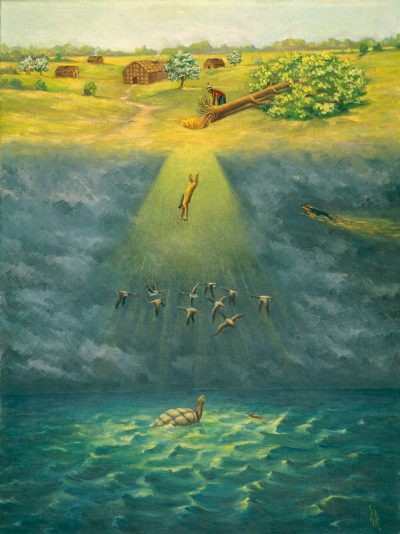Thanksgiving Was About “Taking”, “Colonialists took the land”

All Global Research articles can be read in 51 languages by activating the Translate Website button below the author’s name.
To receive Global Research’s Daily Newsletter (selected articles), click here.
Click the share button above to email/forward this article to your friends and colleagues. Follow us on Instagram and Twitter and subscribe to our Telegram Channel. Feel free to repost and share widely Global Research articles.
***
No one will dispute that the Indigenous peoples of Turtle Island from Umingmak Nuna (Ellesmere Island) to Tierra del Fuego were here long, long before the White Man arrived.
So, if land is to be “owned,” it seems only right that the people who first settled it would become the owners. However, the Europeans who chanced upon Turtle Island claimed it in the name of their God and their rulers. Now, if Martians were to land here and claim the land, would any of the inhabitants of the western hemisphere accept that? No, because the Martians were latecomers, and they have their own planet. So by what morality do European Johnny-come-latelies lay claim to Turtle Island? And by Johnny-come-latelies, that is many millennia after the First Peoples arrived.
The First People were originally believed to have crossed the Bering Ice Bridge some 12,000 YA. That time frame has now been superseded, as even in Canada, the evidence is that Indigenous peoples were in the Bluefish Caves in Yukon 24,000 YA. And now some researchers are positing that the first humans might have been here as long as 130,000 YA. At any rate, that is many millennia longer than the first White Men, the Norsemen, who stayed for a while in Ktaqmkuk (Mi’kmaw designation for Newfoundland) back in 1000 CE.
Nonetheless, the Europeans arrived, claimed and took (stole would be an accurate verb) the continents north and south.
Today is Thanksgiving Day in Canada. Thanksgiving traces back to 1621 in the United States. In Canada, it originates with the English explorer Martin Frobisher’s third voyage in 1578. Frobisher arrived in Ktaqmkuk/Newfoundland while seeking the Northwest Passage. It was in Ktaqmkuk/Newfoundland that Frobisher had a meal of salt beef, biscuits and mushy peas to celebrate and give thanks for their safe landing.
But the arrival of the White Man was not about giving; it was about taking that has continued to this day.
What has been taken (Canadian context, but applicable in the US)?
- First of all, colonialists took the land. It has been divvied up into provinces and territories, black-topped, and renamed (quite often to the names of colonialist).
- Their children. The state had the RCMP remove children from their families and be placed in Indian Residential Schools.
- Their spirituality. Indigenous peoples were forcibly proselytized in the church-run schools.
- The rich culture. Canada outlawed the Potlatch, an important ceremony of the Pacific Northwest First Nations. [1]
- The vibrant languages. Children were forbidden to speak their language in the residential schools. Linguicide was the result.
- Law and governance. Indigenous peoples were now subject to White Man’s laws. Even their ways of governing themselves were rejected by the White Man.
- The resources. White Man practiced capitalism, an economic system antithetical to Indigenous peoples. “Those Indians who go over to the white man can be nothing but beggars, for he respects only riches, and how can an Indian be a rich man? He cannot without ceasing to be an Indian,” said the revered leader of the Oglala Lakota, Red Cloud (Maȟpíya Lúta) [2] Professor John Lutz wrote of the historical “dialogue” and the subordination of Indigenous economies in the Pacific Northwest. Prior to the establishment of white settlement, the Indigenous peoples of present day British Columbia were among the richest and best-fed societies in the world. [3] Thus, the trees were felled, the land was mined, the oil and gas were drilled, the earth and water was polluted.
- The fish and game were exploited and became scarce or extinct. The bison no longer roamed the prairies in huge herds. The salmon no longer return to the rivers in previous abundance. The great auk and the passenger pigeon are extinct, as is the Atlantic walrus and blue walleye of the Great Lakes.
- Sovereignty. The Indigenous peoples find themselves deprived of nationhood and hindered in their freedom of movement by colonially created borders. Even within the unceded territory of their ancestors, the colonial government acts as the owner and ruler. Thus, the Wet’suwet’en find themselves in a battle against the forces of the Canadian state. The hereditary chiefs are ignored and subject to arrest. And Canada is held to account by Amnesty International.
*
Note to readers: Please click the share button above. Follow us on Instagram and Twitter and subscribe to our Telegram Channel. Feel free to repost and share widely Global Research articles.
Kim Petersen is an independent writer. He can be emailed at: kimohp at gmail.com. He is a regular contributor to Global Research.
Notes
- See Potlach by George Clutesi.
- Quoted in Charles Eastman, Indian Heroes and Great Chieftains: 9.
- John Lutz, Makúk: A New History of Aboriginal-White Relations. See review.
Featured image: Sky Woman (1936), by Seneca artist Ernest Smith, depicts the story of Turtle Island. (Licensed under the Public Domain)

